Queen Elizabeth II: 'Royal blessing' that helped devolution
"I always say there was one Queen Elizabeth who saved the Welsh language and there was another one who gave Wales devolution."
Dafydd Elis-Thomas, one of Wales' prominent political figures, is adamant the nation should be thankful for the influence of both Queen Elizabeths.
While Queen Elizabeth I, of the Welsh royal dynasty the Tudors, is said to have regularly spoken Welsh at court, some 400 years later Queen Elizabeth II helped bring an acceptance of devolution in Wales, according to the life peer.
After the 1997 referendum returned a narrow majority in favour of devolution in Wales, the Queen attended all six opening ceremonies for the Senedd.
She opened the Senedd for the final time in October 2021, and was accompanied by the Prince of Wales and the Duchess of Cornwall.
On Sunday, the Senedd was recalled for a special session following her death, aged 96, with First Minister Mark Drakeford paying tribute to the Queen's "personal commitment to Wales and its democratic institutions".
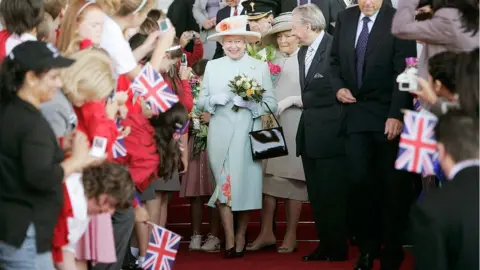 Getty Images
Getty Images"From the very beginning the Queen was here to give her royal blessing to the institution," said Lord Elis-Thomas, a former Plaid Cymru leader who was made the presiding officer and kept in close contact with the Queen and her advisers.
"It was saying 'I'm behind this' and she embraced it fully. She would perform the duty of opening of the assembly on a par with the state opening of Parliament.
"It was about using all the ceremony that surrounds the Queen as part of the celebration of devolution. She was speaking as the head of state which was changing along with devolution.
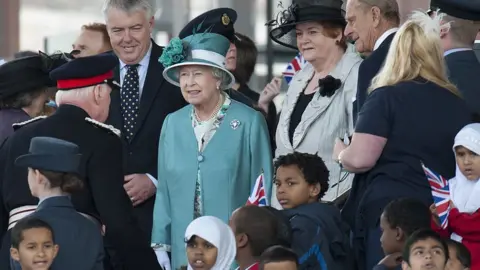 Getty Images
Getty Images"And I think it's been crucial to the success of the enterprise. Because it's difficult for the kind of people who support the monarchy to object when they find the monarchy is supporting devolution.
"When I suggested to her one time, saying it was very good of her to come all the time to the opening and if she sent the Prince of Wales we'd understand… oh no, that was not going to happen. She had to do it herself."
Her acknowledgement of "historic national identities" was not a recent thing.
Following much political wrangling, in 1977 separate bills were introduced for Wales and Scotland by Parliament, paving the way for devolution referenda.
In her Jubilee Speech to MPs that year, the Queen addressed the matter.
"The problems of progress, the complexities of modern administration, the feeling that metropolitan government is too remote from the lives of ordinary men and women, these among other things have helped to revive an awareness of historic national identities in these islands," she said.
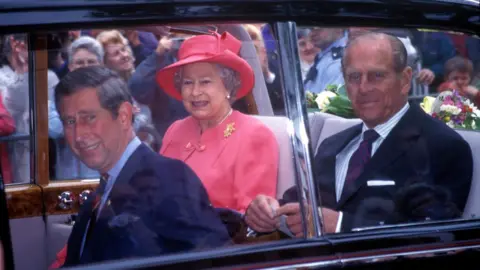 Getty Images
Getty Images"They provide the background for the continuing and keen discussion of proposals for devolution to Scotland and Wales within the United Kingdom.
"I number Kings and Queens of England and of Scotland, and Princes of Wales among my ancestors and so I can readily understand these aspirations.
"But I cannot forget that I was crowned Queen of the United Kingdom of Great Britain and Northern Ireland."
That last line, Lord Elis-Thomas points out, was done to balance her acknowledgement of devolution and said in not so many words, 'come what may, I am still your Queen'.
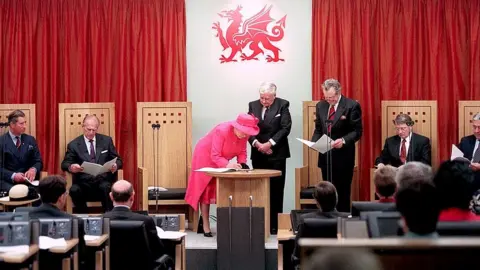 Getty Images
Getty ImagesTwo years after Wales voted for devolution, the Queen arrived in an open-top carriage along with the Duke of Edinburgh and Prince Charles, for the opening at the Senedd's initial home, Crickhowell House on 26 May 1999.
Inside she signed a special edition of the Government of Wales Act, which symbolised the transfer of powers from Westminster. It would, the Queen said, extend a bridge into the future, a beginning and an opportunity.
"This opening today marks a new and significant direction in the way Wales is governed," she said. "It's a moment of renewal true to the spirit of Wales."
Lord Elis-Thomas said she enjoyed the openings of the Parliament and had told him how much she appreciated the ceremonial aspect of it, along with the poetry and music "and what that meant to her".
"She did once say to me that we were to be commended for the brevity of our ceremonial," he added.
"So I thought that was a big plus."
As the Senedd got bigger and more established, so too did the ceremonies accompanying each royal visit - something the Queen commented on.
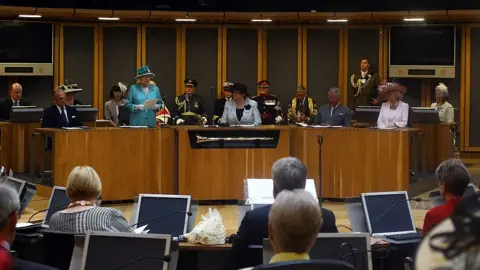 Getty Images
Getty ImagesLord Elis-Thomas said the first opening ceremony in 1999 had been a relatively simple affair.
But when the new Senedd building was opened in 2006, the Royal Family was welcomed with a salute from HMS Westminster and a flypast of the Hawk trainer jets which had been based at RAF Valley on Anglesey.
"She did remark on how we had increased the ceremonial and really I wasn't sure how to justify this to her so I said 'of course, we have done it in your honour ma'am since you have come and opened this building for us'.
"And she was very pleased with the whole event. So she could see we were developing our democratic institutions in a way that made it understandable, made it accessible to people."
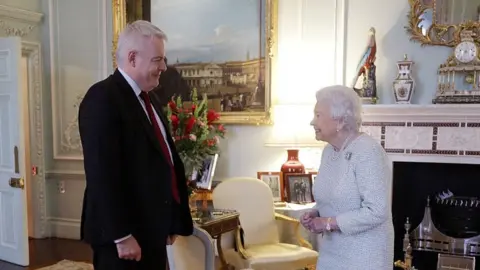
Lord Elis-Thomas, a former MP, member of the Senedd and Plaid Cymru leader, was appointed to the Privy Council for the part he played in helping to deliver devolution to the people of Wales - and as such was in a position where he could give advice to the Royal Family about their duty and relationships, especially to Wales.
"Her Majesty the Queen was always very keen to be fully briefed about what was going on here, not just before the royal visits to open [the Senedd] and to open the assembly every four or five years.
"But also to understand what was going on within her kingdom and that was a huge intelligence which she had about constitutions and about how governments and ministers behave. And it was interesting to hear her talk about her experience in the Commonwealth particularly and comparing that to her experience in a devolved United Kingdom."
King Charles III is set to visit Wales for the first time as the King on Friday.
Cardiff council confirmed the visit will begin at Llandaff Cathedral where the Royal couple will join a service of prayer and reflection attended by senior faith leaders.
They will then visit the Senedd to receive a motion of condolence, followed by a reception at Cardiff Castle, where the King will meet First Minister Mark Drakeford and the Senedd's Presiding Officer, Elin Jones.
